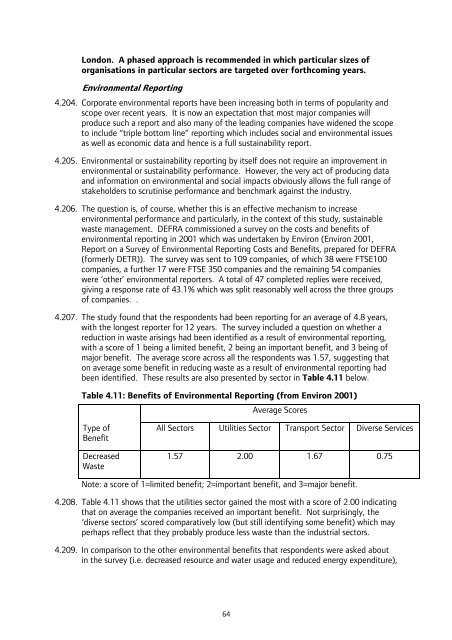London Wider Waste Strategy - London - Greater London Authority
London Wider Waste Strategy - London - Greater London Authority
London Wider Waste Strategy - London - Greater London Authority
You also want an ePaper? Increase the reach of your titles
YUMPU automatically turns print PDFs into web optimized ePapers that Google loves.
<strong>London</strong>. A phased approach is recommended in which particular sizes of<br />
organisations in particular sectors are targeted over forthcoming years.<br />
Environmental Reporting<br />
4.204. Corporate environmental reports have been increasing both in terms of popularity and<br />
scope over recent years. It is now an expectation that most major companies will<br />
produce such a report and also many of the leading companies have widened the scope<br />
to include “triple bottom line” reporting which includes social and environmental issues<br />
as well as economic data and hence is a full sustainability report.<br />
4.205. Environmental or sustainability reporting by itself does not require an improvement in<br />
environmental or sustainability performance. However, the very act of producing data<br />
and information on environmental and social impacts obviously allows the full range of<br />
stakeholders to scrutinise performance and benchmark against the industry.<br />
4.206. The question is, of course, whether this is an effective mechanism to increase<br />
environmental performance and particularly, in the context of this study, sustainable<br />
waste management. DEFRA commissioned a survey on the costs and benefits of<br />
environmental reporting in 2001 which was undertaken by Environ (Environ 2001,<br />
Report on a Survey of Environmental Reporting Costs and Benefits, prepared for DEFRA<br />
(formerly DETR)). The survey was sent to 109 companies, of which 38 were FTSE100<br />
companies, a further 17 were FTSE 350 companies and the remaining 54 companies<br />
were ‘other’ environmental reporters. A total of 47 completed replies were received,<br />
giving a response rate of 43.1% which was split reasonably well across the three groups<br />
of companies. .<br />
4.207. The study found that the respondents had been reporting for an average of 4.8 years,<br />
with the longest reporter for 12 years. The survey included a question on whether a<br />
reduction in waste arisings had been identified as a result of environmental reporting,<br />
with a score of 1 being a limited benefit, 2 being an important benefit, and 3 being of<br />
major benefit. The average score across all the respondents was 1.57, suggesting that<br />
on average some benefit in reducing waste as a result of environmental reporting had<br />
been identified. These results are also presented by sector in Table 4.11 below.<br />
Table 4.11: Benefits of Environmental Reporting (from Environ 2001)<br />
Type of<br />
Benefit<br />
Decreased<br />
<strong>Waste</strong><br />
Average Scores<br />
All Sectors Utilities Sector Transport Sector Diverse Services<br />
1.57 2.00 1.67 0.75<br />
Note: a score of 1=limited benefit; 2=important benefit, and 3=major benefit.<br />
4.208. Table 4.11 shows that the utilities sector gained the most with a score of 2.00 indicating<br />
that on average the companies received an important benefit. Not surprisingly, the<br />
‘diverse sectors’ scored comparatively low (but still identifying some benefit) which may<br />
perhaps reflect that they probably produce less waste than the industrial sectors.<br />
4.209. In comparison to the other environmental benefits that respondents were asked about<br />
in the survey (i.e. decreased resource and water usage and reduced energy expenditure),<br />
64
















